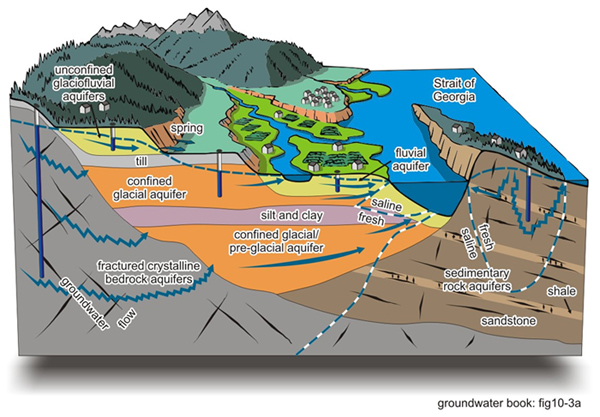 The big challenge with good policy is the need for good information. While justice should be blind to who is before her, she should have as much relevant information as possible. The proposed Water Sustainability Act has some policy ideas that need a lot of information. It doesn’t provide all that much insight about how that information is going to be collected and made available.
The big challenge with good policy is the need for good information. While justice should be blind to who is before her, she should have as much relevant information as possible. The proposed Water Sustainability Act has some policy ideas that need a lot of information. It doesn’t provide all that much insight about how that information is going to be collected and made available.
The act proposes integrating groundwater with the current FITFIR surface licencing system. For surface waters it is relatively easy to identify bodies of water and how they are connected. We have been able to issue licences and to map the relationships between them. We have restricted water sources when there is too much licenced relative to the normal yield of that source. It has sort of worked.
Integrating groundwater into this system means knowing how surface and groundwater are connected. In many places we don’t know what is going on under ground. We don’t have enough test wells or other ways of measuring groundwater flow. In many cases we also don’t know how much water is being withdrawn from an aquifer, and which wells are tapping which aquifers. Often we may not know when a well was drilled either. If we are going to integrate groundwater into FITFIR, we will have to gather much of this information.
Updating beneficial use to insist that water be used efficiently means we need to figure out what efficient use means for any given water licence. That will depend on things that the licencee can choose, such as the crop being grown or other water using activities, and on things that cannot be chosen, such as soil type. If we are to review a licence and reduce or cancel it because the water was not being used efficiently, then we will need to have this information.
The proposal says that water allocation decisions will take account of environmental flow needs. It is recognized that environmental flow needs depend on the unique physical and biological environments that exist throughout the province. Since some parts of British Columbia are among the wettest in Canada, while others are among the driest, this makes sense. A simple rule of thumb, be it a volume or a share of flows, will not be adequate. However, tailoring the environmental flow needs to each unique environment means we need to know enough about each environment to do so. Right now, in many situations, we don’t.
 In tandem with environmental flow needs, it is also proposed to identify critical environmental flows during times of scarcity. How much water is just enough in a dry, hot year? How will this be impacted by climate change? Should these amounts be changed as ecological zones and species change? Since things are changing, we should be monitoring on an ongoing basis, so that we can adapt to these changes. To date monitoring has been at best incomplete, an easy victim of budget cutting in Victoria.
In tandem with environmental flow needs, it is also proposed to identify critical environmental flows during times of scarcity. How much water is just enough in a dry, hot year? How will this be impacted by climate change? Should these amounts be changed as ecological zones and species change? Since things are changing, we should be monitoring on an ongoing basis, so that we can adapt to these changes. To date monitoring has been at best incomplete, an easy victim of budget cutting in Victoria.
The cost and benefits section of the proposal document suggests that many of these information gathering costs will be borne by applicants for water licences. Most of these applicants will turn to consultants. Will Victoria demand a high standard from these assessments, or in the face of pressures from applicants, will it relax the quality and detail of information required from applicants?
 Will the province take responsibility for gathering baseline information, such as continual monitoring of stream flows, groundwater levels, and habitat health? While it may look good on the government ledger if it is not paying for these activities, it is wasteful if consultants are repeatedly collecting the same information to complete an application. It does not save us collectively money if we are paying to do a job ten times when if we got together and shared the cost we would only do it once. It is even worse if we give applications a pass because we don’t have good enough baseline information to determine if it is a bad idea. Will Victoria be courageous enough to adopt a precautionary approach and limit water allocations when there is uncertainty, or will it bow to the pressures of development?
Will the province take responsibility for gathering baseline information, such as continual monitoring of stream flows, groundwater levels, and habitat health? While it may look good on the government ledger if it is not paying for these activities, it is wasteful if consultants are repeatedly collecting the same information to complete an application. It does not save us collectively money if we are paying to do a job ten times when if we got together and shared the cost we would only do it once. It is even worse if we give applications a pass because we don’t have good enough baseline information to determine if it is a bad idea. Will Victoria be courageous enough to adopt a precautionary approach and limit water allocations when there is uncertainty, or will it bow to the pressures of development?
The proposal includes a number of cases where small (low risk) applications will be exempt. The cost burden of preparing a complicated application would be prohibitive for many small users, such as domestic licences and wells. However, the cost of an application likely doesn’t increase that much with the volume being applied for. Excepting the small exemptions, regulations that put the burden of information gathering on the applicant invariably favour larger applicants and applications. Would it be better if more of the knowledge necessary to sustainably manage our water resources was collected by Victoria and made available to all, to avoid such a bias? Is Victoria willing to pay for it?
 The proposal also suggests that licence application and rental fees, new fees related to groundwater, etc. may need to be adjusted to cover additional costs created by the water sustainability act. Perhaps this revenue source could also be used to pay the cost of gathering valuable baseline information. A panel of experts could be assembled with the task of determining what information was required to ensure that the objectives of the act were being satisfied. They could then set an increment to licence rental fees that would pay for these activities. The collected fees would not pass through the general budget, but rather flow directly to a ‘water statistics’ branch charged with collecting and maintaining vital water related statistics.
The proposal also suggests that licence application and rental fees, new fees related to groundwater, etc. may need to be adjusted to cover additional costs created by the water sustainability act. Perhaps this revenue source could also be used to pay the cost of gathering valuable baseline information. A panel of experts could be assembled with the task of determining what information was required to ensure that the objectives of the act were being satisfied. They could then set an increment to licence rental fees that would pay for these activities. The collected fees would not pass through the general budget, but rather flow directly to a ‘water statistics’ branch charged with collecting and maintaining vital water related statistics.


 Follow
Follow